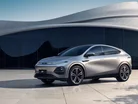XPeng predicts 10 key EV players will dominate automotive

The automotive industry is expected to look a lot different in years to come.
According to the pure-play electric vehicle (EV) manufacturer XPeng Motors, the market will be divided by 10 key players as more businesses enter and take on the big businesses from traditional OEMs to all-electric businesses like Tesla and BYD.
Unsurprisingly, Chinese automakers are expected to be among the final 10 due to their ability to cover more ground. XPeng’s Vice Chair, Brian Gu explained his thoughts, stating that at least three million vehicle sales will be required annually, including global exports.
“To be in that ‘three million club’ you cannot be a China-only player—you have to be a global player. We think, in that scenario, maybe close to half your volume is coming from outside of China,” says Gu.
“In five to 10 years, it’s going to be a much more concentrated market. I think the number of players will probably be reduced to less than 10 at the global stage.”
The declining US-China relations complicates the situation as Chinese businesses look to branch out into new markets.
Will China lead an electrified automotive industry?
Not only does electrification break down the barriers to entering the automotive sector, but the industry is likely to become saturated very quickly—if not already—with multiple pure-play manufactures and technology businesses venturing into the market.
In recent years, we’ve seen multiple new tech brands and startups releasing cars, including XPeng, as technology takes precedence over internal combustion engines. We’re already seeing the shift taking place at technology shows like CES where tech innovators showcased their EV prototypes.
As a leading country in the technology space, China is slowly making the transition from localised EV distribution to meet the needs of customers globally.
From a financial perspective, ING Group suggested in February 2023 that sales of Chinese EVs slowed, but will continue to grow steadily throughout the year. The most detrimental years for the Chinese automotive sector were before the time of the coronavirus pandemic with steady regrowth from 2021.
In 2022, 23.5 million passenger cars were sold in China, equating to a 10% increase from the previous year. Of all vehicles sold, battery-electric vehicles (BEVs) and plug-in hybrid electric vehicles (PHEVs) represented over a quarter, representing a steady growth in the adoption of EVs despite a slowing overall automotive.
This could represent a general transition in the way people travel, particularly with car sharing, ride-hailing, and other means of transportation available to commuters.
Nevertheless, the success of Chinese companies moving into the US market hinges on the availability of chips. The US restrictions on access to cutting-edge technologies developed there raise concerns for the likes of XPeng as one of the main hurdles of global expansion.
- Ford: US$189m Investment Powers Halewood's EV TransformationTechnology
- Voltpost Secures Grants for Nationwide Lamppost EV ChargersCharging & Infrastructure
- San Francisco Expands Curbside EV Charging ProgrammeCharging & Infrastructure
- Italy Accelerates EV Shift with Siemens' Charging SolutionsCharging & Infrastructure


